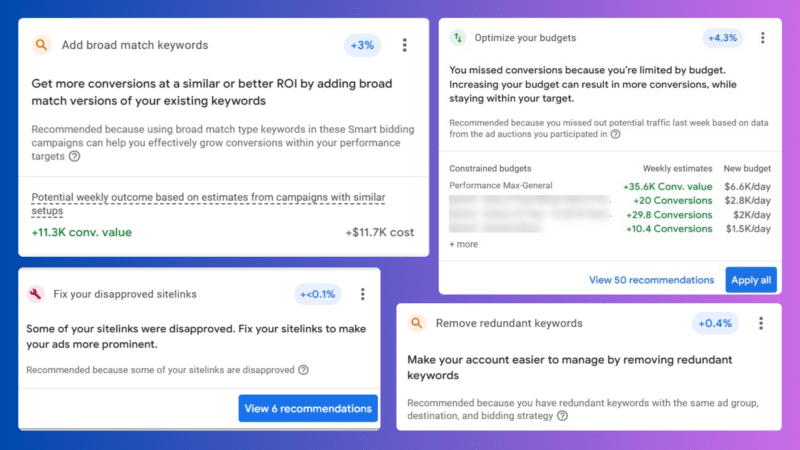
Google Ads recommendations often spark debate among advertisers.
While some are highly situational and require careful consideration, others can actively harm your account’s performance.
However, some recommendations offer valuable insights or significantly improve results when applied effectively.
This article explores the most common recommendations:
- Those that should be ignored because they typically do more harm than good.
- Those worth evaluating for the insights they provide.
- Those that are almost always worth using to optimize your campaigns.
Recommendations I always ignore
Some recommendations are so poor that they are instant dismissals.
On rare occasions, one might be useful. However, spending hours looking through them all to find a single good one is a waste of time.
Optimize your budgets
Google is good at math. Their automated bidding generally works well. However, it seems they can’t do math regarding budgets.
Raising your budget by $46,200 per week to receive $35,600 more in conversion value is a quick way to go out of business.
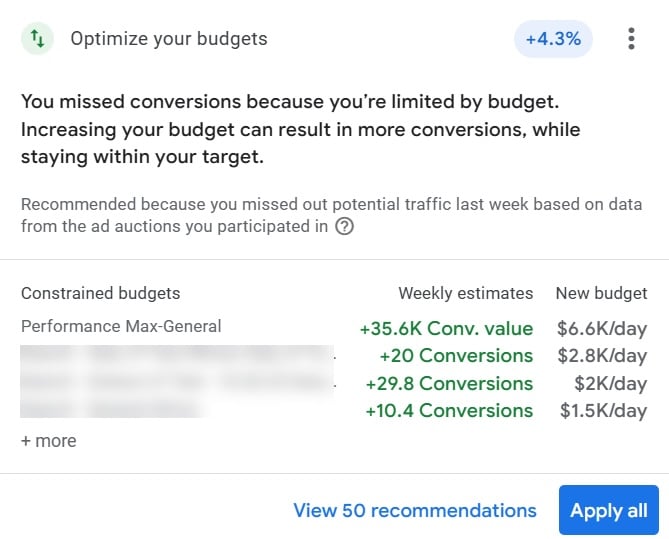
After reviewing all 50 of these recommendations, I found that every single one would have caused a significant drop in ROAS or doubled the CPAs. In some cases, the CPAs were 10 times higher.
That’s why I always ignore budget recommendations.
Add broad match keywords
Broad match has its place, but only after carefully evaluating your account.
No one should blindly use this match type because it was a recommendation.
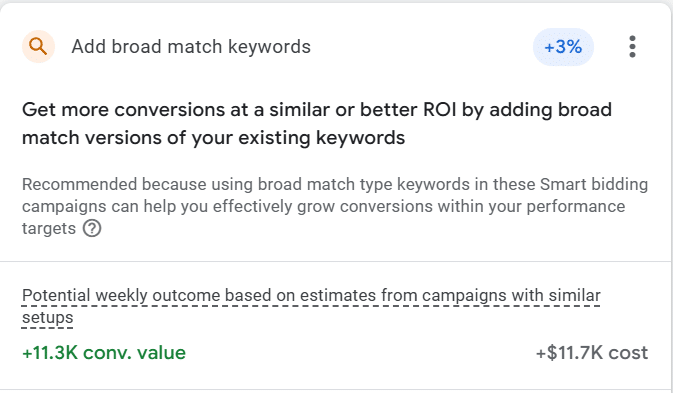
If your lost impression share budget is greater than 10%, and you primarily use exact and phrase match, adding broad match usually worsens your performance.
Your bid strategy dictates how well broad match will work for a campaign. You must evaluate your bid strategy before using broad match.
Choosing to use broad match is decided by performance, bid methods, and budget.
Your overall strategy will determine your choice to use or skip broad match, not an automated recommendation.
Dig deeper: Automated bidding in Google Ads: How to get the best results
Remove redundant keywords
At first glance, this seems like a good recommendation.
You have almost the same keyword multiple times, so removing the duplicates can make your account easier to manage.
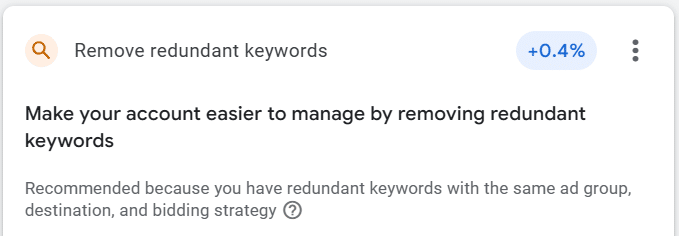
However, removing these keywords causes Performance Max to trump your search campaigns.
Since search campaigns have higher conversion rates than PMax campaigns, this recommendation often results in fewer conversions.
This is another recommendation you can always ignore as it can only hurt your performance.
Dig deeper: Why advertisers should reassess Google Ads recommendations
Always evaluate
Some Google Ads recommendations are always worthy of evaluation.
These are my favorite recommendations that cause me to examine the account in more detail.
Remove conflicting negative keywords
Keyword conflicts occur when one of your negative keywords is blocking one of your keywords from showing.
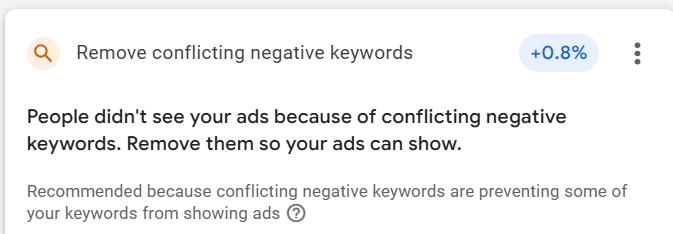
These are always worth fixing, though fixing doesn’t always mean removing the negative keyword. Sometimes, it involves pausing the keyword instead.
Unfortunately, Google doesn’t check negative keyword lists for conflicts.
In about 90% of accounts I review, lists older than five years contain at least one conflict, and sometimes even thousands.
Many people ignore this recommendation because they want to temporarily block a keyword or aren’t sure if they want to show for it or not.
However, these keywords can still receive impressions and clicks.
If the search term matches your keyword and the negative keyword isn’t in the search term, the keyword can still show an ad.
This means you are showing for keyword variations but not the keyword itself.
These should always be examined and action taken to pause the keyword or remove the negative keyword.
Make your headlines and description more unique
I don’t care about ad strength since lower ad strength ads often outperform higher ad strength ads. I also ignore the recommendation to add more headlines.
Fewer headlines reduce the potential combinations, increase the data for each ad combination, and often improve your CTR and conversion rates.
However, most of the RSA recommendations are useful.

The recommendation to make your headlines and descriptions more unique often means you:
- Have too many headlines related to the keywords in the ad group.
- Don’t have enough CTAs, USPs, or benefit statements in your ads.
Adding a variety of assets generally improves both CTR and conversion rates.
When you see the recommendation to make your headlines more unique, examine your headline assets.
Then, make the necessary adjustments to ensure you are using a variety of headlines and not just headlines related to your keywords.
If you get a recommendation to include popular keywords in your headlines but already have two or three headlines with keywords from your ad group, it may indicate your ad group has too many disparate keywords.
In this case, consider splitting your ad group into smaller ones.
Review your keywords and check if your headlines match them well. If some keywords aren’t well represented in the ad, move them to a new ad group with more relevant headlines.
Always use
Some recommendations are always worth using. These are usually related to missing keywords, ads, or extensions.
Add extensions to your ads
Accounts grow and change, and it’s easy to miss something.
Almost everyone wants to use the sitelink and callout ad assets.

When I see this recommendation, I generally add the appropriate ad extension.
There are some exceptions, such as a recommendation to add the call extension to an ecommerce account.
Most accounts want to use several extensions, so it’s worth examining when you see a missing extension recommendation.
Disapprovals
Ad extensions or ads that have been disapproved don’t show. It’s a good idea to examine your disapprovals and fix them so they can be displayed.
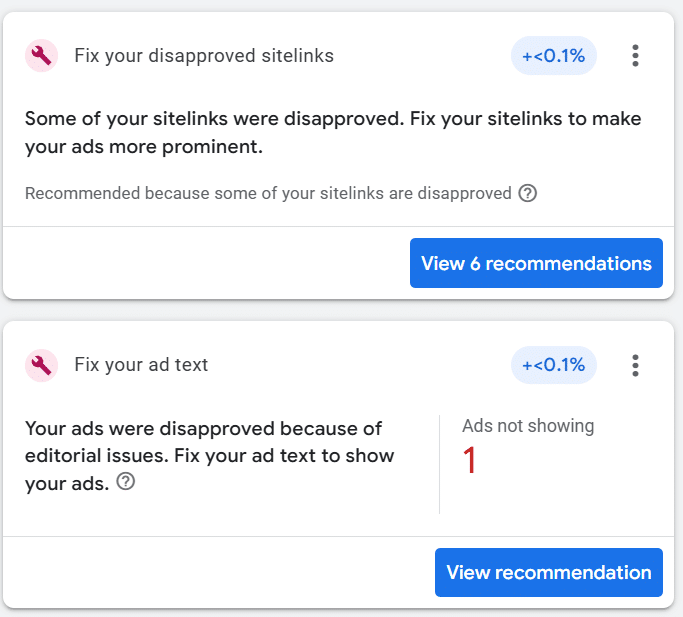
These are straightforward recommendations. View what is disapproved, fix it, and resubmit it for approval.
The best way to see your top recommendations
The repair category offers the most useful recommendations, but the card view makes it difficult to identify which campaigns or accounts need the most attention.
Switching to the table view provides a clearer, at-a-glance overview of all your campaigns or accounts.

The table view will show your campaign or account and the number of ad groups without ads, keywords, or other disapprovals.

The table is highly efficient, allowing you to spot issues, address them, and move on to the next campaign.
Among Google’s recommendations, the repair category is the most valuable to review regularly.
Decoding Google Ads recommendations for smarter ad management
Overall, Google Ads recommendations often have a poor reputation, as many seem designed to push advertisers to spend more or surrender control over their accounts.
This has led many advertisers to tune them out entirely.
However, hidden within these recommendations are valuable insights that can genuinely improve performance.
The next time you encounter a recommendation, don’t dismiss it outright.
Instead, evaluate it carefully to see how it could benefit your account.
source https://searchengineland.com/top-google-ads-recommendations-you-should-always-ignore-use-or-evaluate-451140

0 Comments